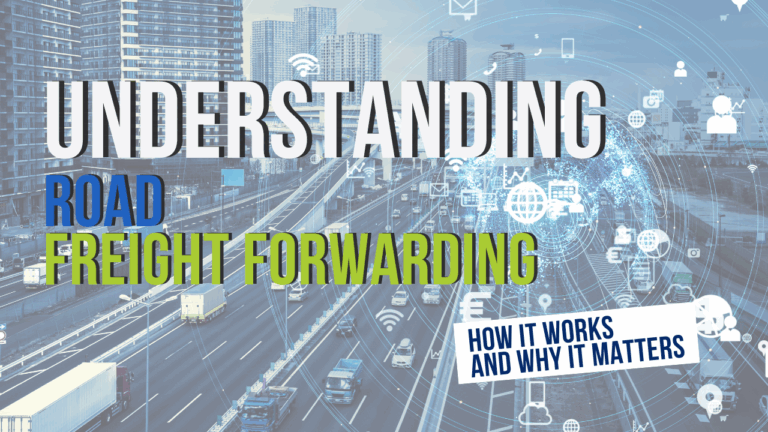We are currently living in a time where trade is at the core of the global economy. The need to fulfill both basic and more specialized demands has led to a constant movement of goods across the world. Shipping things around demands creating a complex network that requires careful planning, agreements, and various transport methods. Logistics, therefore, has become a powerful industry that’s shaped the need for freight forwarders. Yet many don’t fully understand what a road freight forwarder does, or why having the right one can make a huge difference—especially in managing temperature-sensitive supply chains.
 What is a road freight forwarder?
What is a road freight forwarder?
A road freight forwarder doesn’t typically operate its own fleet. Instead, it coordinates shipments between shippers (clients) and a network of trusted trucking companies across countries. The process goes far beyond simply booking a truck — it involves managing every aspect of the journey, ensuring temperature control, compliance, timing, and data transparency.
Think of forwarders as the bridge between your product and its final destination. The ones handling communication, booking, paperwork, and, most importantly, problem-solving. Experts in the field focus heavily on perishable goods, real-time tracking, and food safety, reacting quickly to resolve any issues that may arise along the way.
 How road freight forwarding works
How road freight forwarding works
1. Order planning & booking
Clients submit a booking through a digital system, specifying pickup and delivery points, cargo type, temperature requirements, and deadlines. The forwarder then matches the request with the right carrier, based on availability, route and equipment (e.g., FRC-certified frigo trucks).
2. Transport agreement & preparation
A transport agreement is prepared, vehicle cleanliness and refrigeration settings are checked, and pre-loading instructions are sent to the carrier. In warmer months, forwarders remind carriers to pre-cool trailers before loading begins.
3. Cargo pickup & monitoring
The truck collects the goods directly from the loading site. From that moment, the freight forwarder monitors vehicle movement and the temperature, when possible, keeping both client and carrier informed throughout.
4. Transit & route management
Carriers are guided through the best route, taking into account border wait times, weather, weekend driving bans, and in some cases, ferry or train segments. Forwarders ensure proper rest schedules and cargo safety during these legs.
5. Delivery & data collection
Upon delivery, the forwarder collects unloading reports and thermoprinter data from the carrier to prove temperature compliance. Freight forwarders rely on digital platforms to support the entire process, including uploading data instantly and sharing it with clients in real time.
 Why businesses work with freight forwarders
Why businesses work with freight forwarders
Road freight may sound straightforward but in reality, it’s packed with challenges. From sudden weather shifts to traffic jams at borders, a reliable freight forwarder is your safeguard against disruption. Here’s why to trust a forwarder:
- Temperature-sensitive expertise
Specializing in frigo cargo, forwarders know how to protect delicate goods like fruits, dairy, and frozen products. Especially in summer heat!
- Full visibility and real-time updates
With advanced ERP platforms, clients can track shipments, chat with their logistics team, and access live temperature and location data.
- Compliance and quality assurance
Forwarders make sure carriers follow rules, like valid FRC certifications, equipment cleanliness and route planning.
- Problem-solving mindset
If something goes wrong — delays, mechanical issues, route changes — a strong forwarder acts quickly and proactively, rather than passing the blame.
- Flexible, scalable solutions
Whether it’s a full 33-pallet load from Greece to Europe, or a tricky part-load with temperature splits, forwarders handle both, even during seasonal peaks.
 Choosing the right road freight forwarding partner
Choosing the right road freight forwarding partner
Not all logistics partners are created equal. Here’s what to look for when selecting a road freight forwarder:
Can they confidently manage temperature-controlled shipments and handle food safety measures?
Do they offer online booking, shipment updates, and digital documentation — and notify you when things change?
When things go sideways, will someone step in and fix the issue? Technology is essential but people keep the cargo moving.
Do they understand legislation, realistic transit times, and operational challenges across multiple countries?
From emission regulations to carbon tracking systems like CO₂Path, a modern forwarder helps clients meet environmental goals.
 A note from DS Freight Forwarding
A note from DS Freight Forwarding
At DS Freight Forwarding, we’re proud to represent what a modern road freight forwarder can offer. While this article is meant to highlight the role of freight forwarders across Europe, we do our best our own work embodies these principles.
With deep expertise in temperature-controlled transport, custom-built digital tools (like our myDS system), and a people-first mindset, we ensure our partners enjoy reliability, visibility, and peace of mind.
